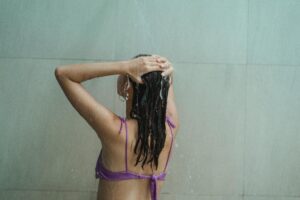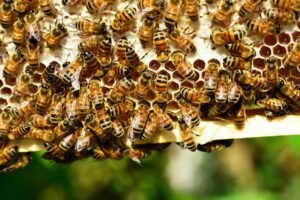How To Naturally Tame Frizzy Hair

There’s nothing wrong with frizzy hair. And having frizzy hair does not necessarily mean that you’re doing anything wrong to your hair to make it happen. Frizzy hair could be a result of damaged hair, or it could occur thanks to hot or humid weather. Certain hair types are naturally more prone to frizz. You probably know this if your hair is naturally wavy or curly – it’s difficult to tame frizzy hair!
Frizzy hair can be hard to manage. And for some, it can spell disaster, turning a perfectly good day into a bad hair day ordeal. But no need to fear. Whatever it is that’s causing the frizz, fortunately, there are ways to reduce or remove it…
Carrier Oils

Woman using natural oils for her hair.
It’s not for nothing that carrier oils are all the hype these days. Aside from being great for use in aromatherapy, they can do pretty amazing things to your hair. Massaging just a small amount of argan oil, avocado oil, coconut oil, or olive oil through your hair strands can instantly smooth and soften your hair.
There’s something special about the way hair soaks up these natural, lightweight oils. What I especially like about carrier oils is that you don’t feel like you have product in your hair. If you apply the right amount – generally just two or three small drops (since too much can leave your hair looking and feeling oily) – your hair should look completely natural with reduced frizz or no frizz at all. If your hair is frizzy because it is damaged, you might want to try more than just oils to combat the frizz.
Natural-Ingredient Shampoos
It’s no secret that a huge percentage of hair products lining store shelves are laden with chemicals and unnatural ingredients. These products might do a good job of cleaning your hair, but they might also leave your hair dry and damaged. Unnatural shampoos often contain strong cleaning agents that work too well to clean your hair, leaving your hair stripped of its natural oils and much-needed moisture.
Washing your hair with natural-ingredient shampoos is a great first step in combating and treating frizzy hair. In general, avoid shampoos containing harmful ingredients such as sulfates, triclosan, fragrance, dimethicone, parabens, and formaldehyde. Instead, go for nourishing shampoos with gentle ingredients such as shea butter or essential oils.
Hydrating Hair Masks

Honey is a great addition to hair masks.
Hydrating hair masks are an excellent way to deeply nourish your hair and fight frizz. You only need to use a leave-in mask once or twice a week. And the best part is that you can create a 100% natural hair mask yourself at home. There’s nothing better than knowing exactly what you’re putting in your hair and being sure that every single ingredient is good for you.
Here’s one idea for a DIY hair mask:
Ingredients
- 2 tablespoons honey
- 1-3 tablespoons olive oil
- 1 cup coconut milk
Directions
Mix all of the ingredients together and apply the mixture to your hair. Concentrate on the frizzy ends and move upwards towards the scalp. Massage your scalp before twisting your hair and putting it up with a clamp. Then wrap a plastic (or shower cap) over your hair and leave the mask in for an hour. Wash your hair, and enjoy softer, smoother tresses!
Embrace Your Natural Hair!
Okay, so you don’t have to throw out your blow dryer, curler, or hair straightener. However, if you do choose to embrace your natural hair, most of the time you will probably enjoy healthier, softer locks.
If you must style your hair every day, try styling your hair with a blow dryer on a low heat setting instead of using a scalding hot curler or hair iron. The hotter the styling tool, the more it damages your hair, eventually leaving it dry and frizzy. Also, don’t forget to apply a heat protectant before styling your hair. This is essential in order to protect your hair from sustaining too much heat damage.
Don’t Shampoo Every Day

Shampooing everyday can dry your hair out.
Every time you wash your hair with shampoo, you’re also washing out some of your hair’s natural moisture. It’s great to clean your hair, but doing it every single day just isn’t necessary.
You want to give your hair a chance to replenish its natural oils. Shampooing every day will probably dehydrate your hair, leaving it dry and frizzy (or oily, as your scalp works overtime to produce more oils). So, how often should you wash our hair? You shouldn’t need to wash your hair more than three times a week to leave your hair clean, healthy, and hydrated.
Co-Washing
If your hair is very frizzy, you can try washing your hair with conditioner only, also called “co-washing” (conditioner-only washing). I know, it’s a little unusual. But if it leaves your hair soft and frizz-free, why not go for it! Thanks to the small amounts of cleaning agents found in conditioners, your hair shouldn’t stay greasy or unclean after co-washing. You’ll probably still want to use shampoo on your hair once or twice a week for a deeper cleanse. But every other day, you can co-wash using a natural-ingredient conditioner and enjoy super soft hair.
Conclusion
From having naturally frizzy hair for as long as I can remember, I know that treating frizz isn’t easy. Or fun. There are different hair types and levels of frizz. And what works for one person might not work for someone else, so don’t despair if a co-wash or hair mask just doesn’t do the trick for you. Using another conditioner or hair mask, or a completely different anti-frizz technique might work instead. It’s all about trial and error until you find the right approach.
While I do try to tame my frizz naturally, I’ve learned to embrace my naturally wavy hair that’s prone to frizz. Hair doesn’t have to look super sleek – those voluminous curls or waves could look gorgeous, even with some frizz.


